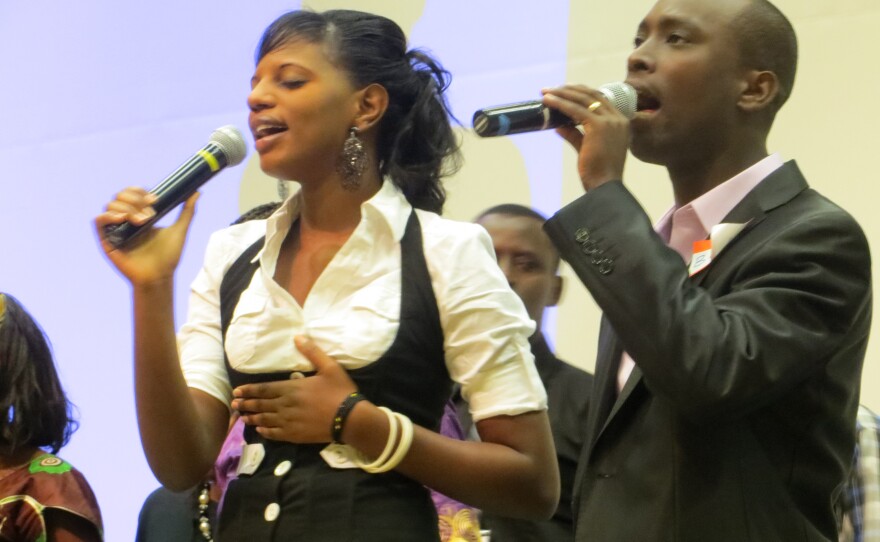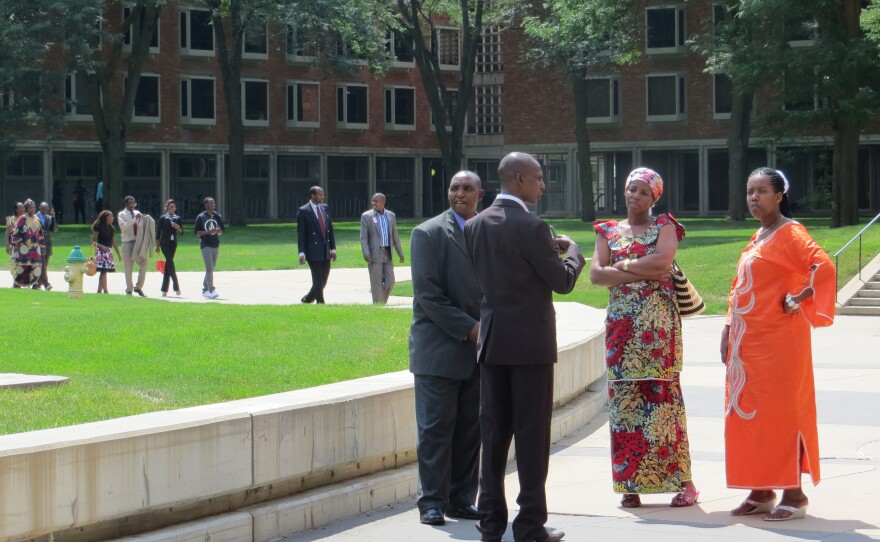Human rights groups are expecting thousands of refugees from the Democratic Republic of the Congo to soon be resettled in the United States. Years of war and ethnically-motivated violence have led to a humanitarian crisis, forcing hundreds of thousands to leave their homes.
Iowa Public Radio’s Durrie Bouscaren checks in with a group of Congolese that arrived in Iowa years ago.
It’s been a long journey for 24-year-old Nkingi Boaz, who was born the son of a pastor in the city of Uvira, on the eastern edge of the Democratic Republic of the Congo. He came to Iowa as a refugee, determined to find his way.
"They told us we were going to start a new life," he said.
Boaz moved to Des Moines five years ago, graduated from Urbandale High School and then Des Moines Area Community College. To support his small family while he was in school, he worked full time at a local nonprofit for people with mental disabilities. In the fall, Boaz says he’ll attend Grand View University to study computer science--but memories of the Congo weigh heavy on his mind.
"I was always thinking about my country. Why did I leave my country. Why I am here," Boaz said.
But there’s one memory of his country, that links Boaz to many other families in Des Moines. He’s a survivor of the Gatumba Massacre.
Nine years ago, a rebel group called the National Liberation Forces stormed a refugee camp in Gatumba, on the western edge of Burundi. The victims were among the Banyamulenge minority who had fled ethnically-motivated violence in the Kivu regions of the Congo. The death toll reached at least 150.
For a weekend, the Gatumba Refugee Survivors Foundation gathered in Des Moines to share memories and call for peace in the Congo. They mark the anniversary every year in different cities around the country— this time, Boaz helped coordinate the event.
When Boaz took the stage to tell his story, he choked up. He lost his father, and six siblings in the massacre. His mother was shot and badly burned, but survived.
"I was sleeping with my two big brothers, in the same bed. They were killed. I don’t know how I got saved," Boaz said.
The survivors of Gatumba became refugees a second time, leaving for other refugee camps and eventually, resettling around the world.
"Sometimes when I watch news and watch what’s going on in my country now, I don’t feel safe. I always think that the people who we left will be killed," Boaz said.
Violence in the Congo hasn’t abated over the past decade. Human rights workers will tell you it’s been much of the same. The number of internally displaced people in the region has reached 2.5 million.
In Iowa, the arrival of Congolese refugees has slowed to a trickle in recent years—only 13 were resettled last year in Coralville and Cedar Rapids, according to the office of the United Nations High Commissioner for Refugees. But many more are on their way, says Shelly Pitterman, a UNHCR Regional Representative for the United Nations High Commissioner for Refugees, as he ticks off the numbers of people soon to enter the United States.
"8,000 in 2013, 13,000 in 2014… There are already 11,000 or so Congolese refugees who were already resettled over recent years, in the next 3 to 4 years we’ll see that number triple," he said.
Pitterman says conflicts in the Congo have been going on for so long, some of these incoming refugees have been displaced for as long as a decade. More than half are below the age of 17.
"They’re very young, overwhelmingly young. They’re coming from a location where they’ve had poor access to education, if any. And that which they had was not in English, so there’s a lot of cultural orientation to do," Pitterman said.
And in the meantime, Boaz and other members of the Congolese community say they’ll continue to bring attention to the violence in their homeland.
"I think about justice," Boaz said. "We won’t keep quiet until we have peace in the Congo."


